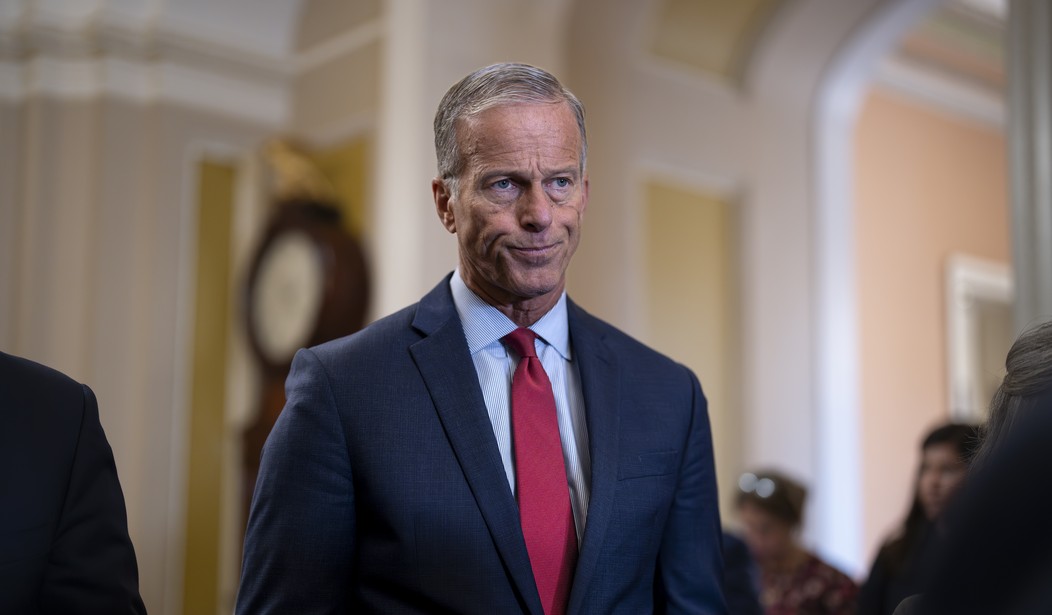I mean that in a sincere sense, not a Chip Diller sense. Remember this sequence from Animal House?
From the reactions on social media to the ongoing contest to replace "Cocaine Mitch" McConnell as Senate (now-)Majority Leader, you'd think that the stampede would run right over Diller, or Donald Trump. But the election got decided by the 53 Americans to whom it is most relevant, and really, to the only 53 Americans who will get impacted by it.
Sen. John Thune (R-SD) ended up winning the election after three rounds of voting, over John Cornyn (R-TX) and Rick Scott (R-FL). What normally would have been an inside-the-Beltway issue got blown into a MAGA test, but it's much less than meets the eye:
Each of the candidates had signaled a break in McConnell’s leadership style, promising more member input and a return to regular order. But Thune was viewed as the candidate most aligned with McConnell and had a slight advantage as his deputy.
None of the three contenders won enough support on the first ballot, forcing a second round that eliminated Scott, the leader of the conference’s right flank. From there, Thune was able to clinch an outright majority, ending Cornyn’s hopes for a return to the Senate’s leadership ranks.
Trump was closest to Rick Scott in this election, both in terms of mutual support during election cycle and populist positioning. Scott tried to get Trump to issue an endorsement, especially to thwart Thune, where mutual animosity had arisen in the previous four years. After Thune criticized Trump over the 2020 election aftermath, Trump tried to get a primary challenger against Thune, and Thune endorsed Tim Scott in the 2024 primary. They have smoothed things over recently, though, and Thune did fundraisers for Trump in this election cycle.
That may be one reason Trump stayed out the caucus election, but the main reason is that it doesn't really matter to him. This wasn't an election over an agenda, or policy choices. This was an election about Senate tactics and strategy in service to the agenda and policies. Trump's in charge of both, and not only does he know it, everyone knows it.
When the party in question holds the White House, the president sets the agenda -- especially a president that just won a significant victory in both the Electoral College and popular vote. That's different from the last four years, when McConnell was the highest-ranking Republican in federal office, along with Kevin McCarthy and Mike Johnson. During Joe Biden's presidency, they set the agenda and the policy choices, because there was no one else to do it. Now, however, the sheriff has ridden back into town with a big mandate, and now the caucus leaders' job is to make the best use of tactics to get what they can out of Congress for Trump.
That's likely why Scott's attempt at a dark-horse campaign for Majority Leader failed. Scott ran the NRSC in the 2022 cycle, which was marked mainly by the failure to take advantage of several potentially winnable races and the retention of the majority by Democrats. Candidate recruitment played a large part in those failures, and Trump played a large part in that recruitment, but that was Scott's job. (Steve Daines took it over in this cycle.) Scott tried to gin up pressure from grassroots MAGA activists, but it clearly didn't work, and likely backfired a bit. Trump's refusal to intervene left Scott twisting in the wind.
So that left Cornyn and Thune, either of whom would have sufficed as the chief tactician. Both worked with McConnell, who will go down as one of the most brilliant Senate tacticians in the history of the chamber. Thune probably has a harder edge as well as good enough relationships in the chamber to get Democrats to work with the GOP when needed. Either one of them would have applied their efforts toward accomplishing Trump's agenda, especially with their own constituents judging them on that effort. In that sense, Thune is even more attuned; South Dakota went Trump +29, while Texas was Trump +14 and Florida Trump +13.
At any rate, Trump didn't think the election was critical enough to his plans to issue an endorsement, and no one can accuse Trump of being a wallflower when it comes to his thoughts on how Congress conducts business. With that in mind, the rest of us have even less reason to fret over the outcome of a caucus election in the wake of Trump's clear victory.
On the other hand, some readers may feel less like Chip Diller than The Dude even after reading this. YMMV, of course.








Join the conversation as a VIP Member